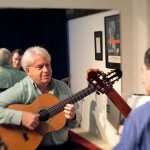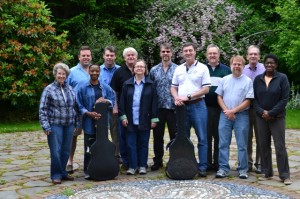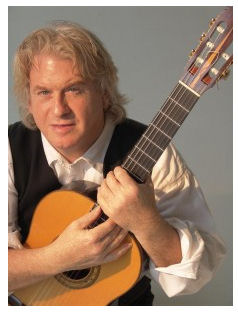First off, welcome to the New Year — always a great time to look forward and make some positive changes in our lives. I’d like to offer three steps that will help your guitar playing development over the next year: small steps, medium steps, and large steps.
Small steps are the ones we take regularly. They’re easy to manage, and an effective way to grow our playing. The power of small steps comes from a consistent march towards a goal. With small steps, we look to maintain a consistent and effective practice that will help to develop technique and repertoire.
Medium steps take longer to accomplish, but help guide the smaller steps. These include the development of specific skills that will make you a more refined player, which will help you to get more satisfaction from playing the guitar.
Large steps are events that take us out of our comfort zone, integrating our world with others, and can have a most dramatic effect on your growth as a guitarist.
Small Steps
Consistency in Practice
 If you’ve lacked consistency, like most of us have, then developing a regular practice schedule is important. I’d suggest starting small. Commit to 20-30 minutes of practice, three days a week. Once you’ve been able to maintain a consistent schedule for a month, then add a day per week, or add 10-15 minutes more to your practice each day. A great goal is to eventually work up to 60 minutes of practice, 5 days a week. For more information on organizing and managing your practice, go to my article “Getting More from Your Practice”.
If you’ve lacked consistency, like most of us have, then developing a regular practice schedule is important. I’d suggest starting small. Commit to 20-30 minutes of practice, three days a week. Once you’ve been able to maintain a consistent schedule for a month, then add a day per week, or add 10-15 minutes more to your practice each day. A great goal is to eventually work up to 60 minutes of practice, 5 days a week. For more information on organizing and managing your practice, go to my article “Getting More from Your Practice”.
Lets cover what to practice….
Technique
 Since you’re already practicing, why not add some technical work? My technique practice includes attention to proper positioning and movements — these I call Primary Skills. Develop these skills through the practice of scales and arpeggios, which I do on alternate days (it only takes ten minutes a day!) If you’re not sure about what to do in your technique practice, then seek out a qualified teacher, find a good book on the subject, or check out the many classical guitar forums that exist on the Internet, which feature a wide scope of technical concepts. Here is one of my favorites: DelCamp Classical Guitar Forum.
Since you’re already practicing, why not add some technical work? My technique practice includes attention to proper positioning and movements — these I call Primary Skills. Develop these skills through the practice of scales and arpeggios, which I do on alternate days (it only takes ten minutes a day!) If you’re not sure about what to do in your technique practice, then seek out a qualified teacher, find a good book on the subject, or check out the many classical guitar forums that exist on the Internet, which feature a wide scope of technical concepts. Here is one of my favorites: DelCamp Classical Guitar Forum.
Repertoire
Next, let’s look at your repertoire list. Are you able to play 5, 15, 30 or 60 minutes of music from memory? Are these pieces performable? If not, set a goal to be able to perform at least one piece — then build to the next level (if you only have five minutes of music performable, shoot for 15 minutes). This is harder than you think, so give yourself plenty of time. Michael Lorimer invited ten guitarists from around the world to study with him on an island in North Carolina. These were experienced, well schooled players. Our initial assignment was to arrive with a full program (60 minutes) ready to perform. Guess how many had a program memorized — one, yours truly— and that’s only because I had just performed my senior recital. It took some of us a year to get a program of 60 minutes ready. So my point is twofold: don’t feel bad if you can’t perform anything yet, and please give yourself ample time to learn to do so. A year is a nice amount of time to double your performable output.
Medium Steps
It’s important to continue to develop a set of specific skills on the guitar. Skill sets, which I call Secondary Skills, are basic skills that should be learned, then maintained. This can include vibrato, slurs, finger independence (the balancing of melody over accompaniment), shifting (left hand thumb placement), etc. These skill sets will take 6-8 weeks, perhaps more, of consistent work to fully integrate into your playing. It’s then important to touch base with each learned skill, practicing them for two weeks about once every four months.
If you can integrate these skills into your regular practice, you’ll have developed five or six new skills in a year! Since there are a finite number of skills that need developing, eventually you’ll be able to just maintain your skills with minimal practice.
Large Steps
Do one big thing for guitar this year by taking a large step! Set up a performance at a local hall. Or share the stage with some friends who may want to also perform. Performing will galvanize all the work you’ve done — it will make you practice better and make you a better player. Perhaps you’ll want to even perform in a master class.

Another large step would be to attend an annual guitar event. Going hand in hand with performing is my Classical Guitar Immersion, a week-long focused event where players learn to integrate practice and performance. Guitar Foundation of America holds an annual event that brings together many guitarists for performances and master classes. These types of events will help integrate your world with other guitarists. Such events can easily catapult your progress by six months. They are educational, inspiring, and fun!
So to review…take small steps of regular practice — remember to first organize, and then execute, a quality practice plan, integrating technical work with repertoire development. Take a medium step by implementing a new skill into your practice for 6-8 weeks. And finally, take a Large Step — find a workshop, master class, or performance venue for you to start.
And remember, with all things, start small to grow big. Walk the fine line of consistency and self flagellation, and give yourself a little slack now and then. Don’t always look at the things you can’t do — look at the good things you already do well!
Please let me know your thoughts!
Thanks,
Scott







I have played for years but never reached my goal. Can you help.
Chris,
Thanks for writing. What are your goals?? How often do you practice, what is a sample of your repertoire (level)?
Scott
i have sought the web for quite sometime trying to find a way to beat inconsistency and seeking how and what should i really practice but your practice review has most of the answers explained very simply.
thanks
Gibson,
Glad you have found my articles usefull! Great to hear. Have you checked out my article on ?
Happy plucking!
Scott